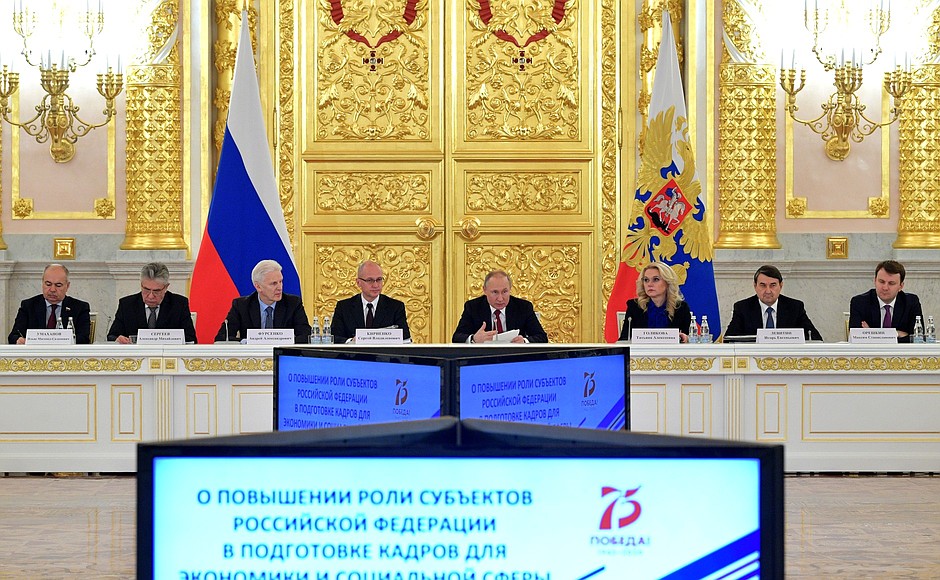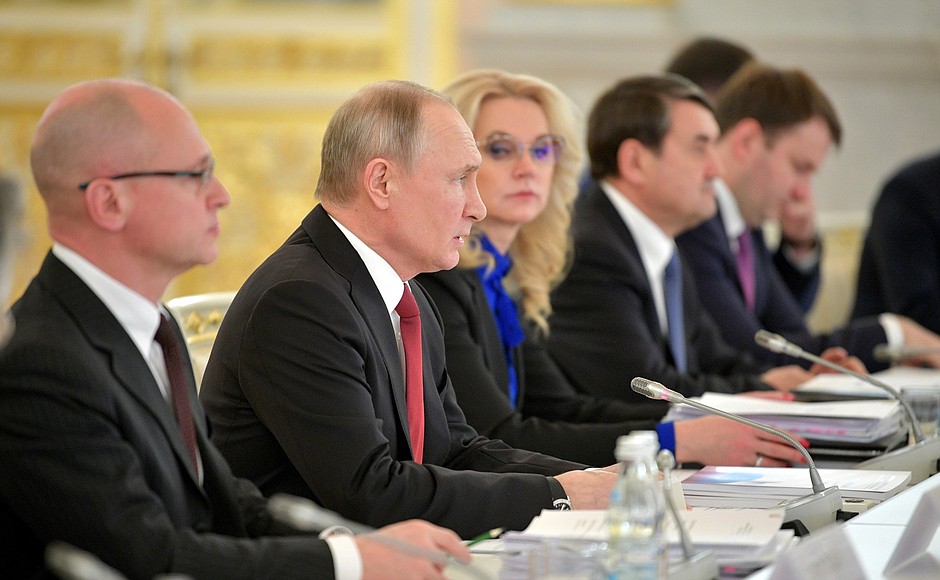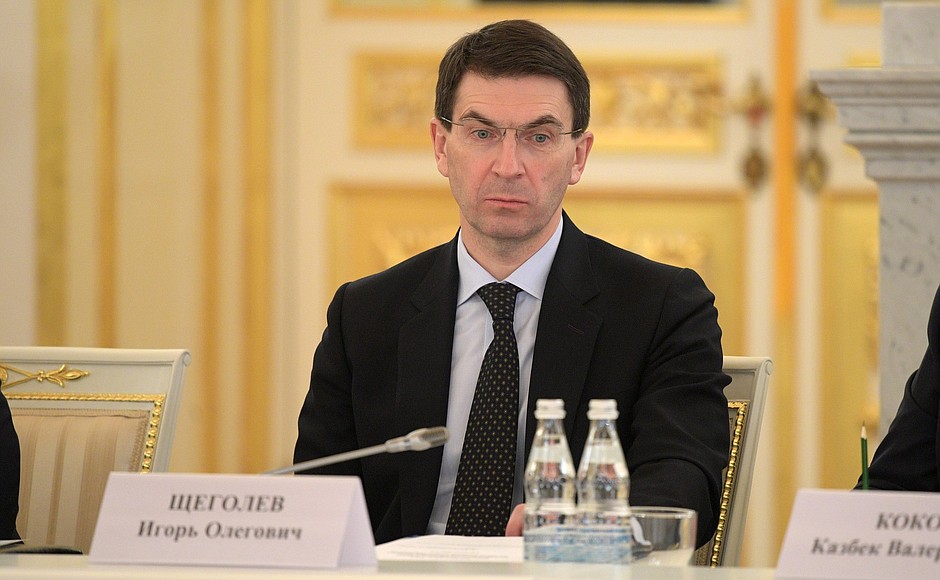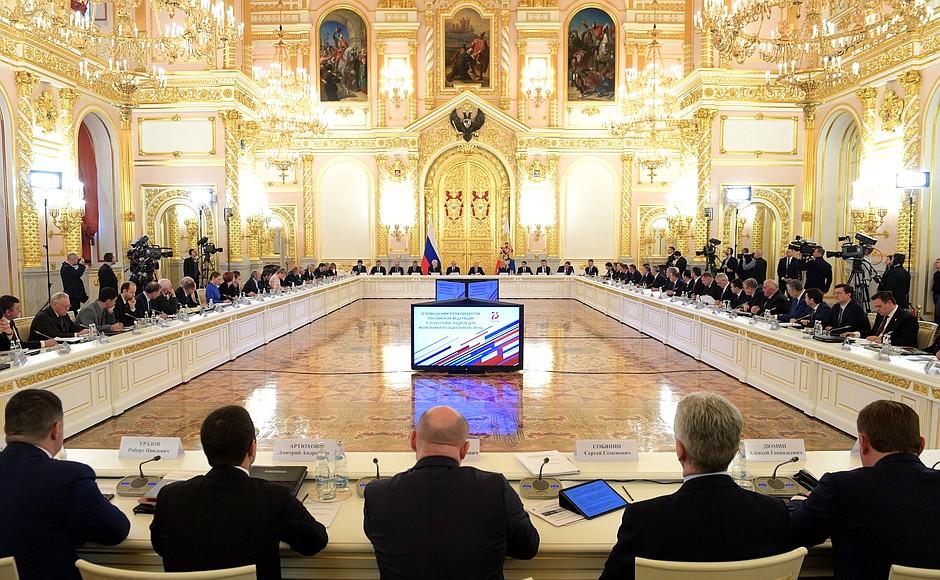The meeting was devoted to enhancing the role of the regions in training professionals for the economic and social sectors in accordance with the President’s May Executive Order and the Strategy for Scientific and Technological Development.
The focus will be on adjusting the system of vocational and higher education to economic requirements, expectations of the state and society, as well as the creation and introduction of novel methods of interaction between educational and academic organisations on the one hand and bodies of power at all levels and employers on the other, with a view to preserving and improving the country’s intellectual potential.
* * *
Vladimir Putin: Good afternoon, colleagues.
You probably noticed that I raised many issues during my recent Address to the Federal Assembly, but one of them is especially important. It concerns all aspects of our demographic development.
It includes decent benefits for families with children, improving the healthcare and social infrastructure, the creation of new jobs in order to increase wages and real incomes, and, of course, the availability of equal and fair conditions for receiving a good modern education, so that the coming generations in Russia realise their huge potential.
The Government, the regions and municipal authorities must work consistently together with civil society and businesses in all spheres of demographic development, including education.
In this connection, I propose that the State Council convene at the beginning of the next academic year to discuss the further development of our general education system. As for our meeting today, which is attended by governors and members of the Council on Science and Education, we should use it to coordinate additional decisions to strengthen university education in the regions.
Of course, much has been accomplished in this field: high-performing federal and national research universities have been created and basic universities are being provided with assistance in over 30 regions.
However, there are still many unresolved problems. The greatest of them is the super-concentration of educational resources in Moscow and St Petersburg. They are home to over 200 universities, or more than 25 percent of the country’s universities, and this not counting their regional branches.
In some periods of our history back in the 19th and 20th centuries, this concentration was objective and possibly justified. But it has clearly become outsized, including because of the social and economic disproportions that developed by the turn of the 21st century. This has become a major challenge when it comes to balanced development throughout Russia.
But I will add right away that it would certainly be a crude mistake to deal with this problem “on command,” through strictly administrative means, to talk about lofty national interests and goals and to forget about life, about the teachers and the students themselves. Any talk of relocating Moscow or St Petersburg universities is certainly unacceptable.
At the same time, we must realise that far from all higher educational institutions in the regions can compete with those in the capitals. This is obvious at this point. They cannot compete in the quality of education and the qualifications of the teachers, not to mention the level of equipment. Laboratories and social facilities have become physically rundown and obsolete.
I understand the choice of many school graduates in the regions. They go to the capitals where education is better and life is more interesting. You and I are well aware of this. We know this. Young people often do not return to the places where they were born and grew up. In such cases, the regions lose the most precious things – talent, specialists, and the younger generation.
See also
You know, there are appeals to return all universities to the system of assigning graduates to workplaces. I have heard this many times. They are made at almost every meeting with the public. But let me repeat that we will not resolve any problems with mandatory measures. Life has changed a lot. It is necessary to create conditions for the self-fulfillment of the young people, modern attractive standards of life and study, and opportunities to achieve success. These are the tasks we must deal with together.
Every year – starting in 2021 – we will increase the number of state-financed openings and give them to the universities in the regions, primarily those regions that need modern, young and promising personnel.
You all come from the regions of the Russian Federation and you know the demand for personnel there. Demand is continuously on the rise because of economic growth. In all, we are planning to allocate an additional 70 billion rubles for these purposes in four years. But this move alone is not enough.
I would like to ask the Government to implement a package of measures on modernising the entire system of higher education in the regions. Education oriented and other national projects must come under this overall goal. And, by the way, this work should include the development of infrastructure, the provision of amenities in cities and territories, and the launching of new production lines and investment projects. Of course, it is necessary to make much better use of the allocated resources.
I would like to repeat that even using all sectoral investment we will not change regional universities and will not raise them to a new level unless we achieve real positive change in local life. I would like the Government, regional governors and heads of municipalities to remember this.
Colleagues,
What are the specific measures that must be carried out as soon as possible but certainly with competence and with the utmost responsibility?
First, we need to keep closing dud universities of which there are still many. However, our goal is higher and more complicated than just getting rid of operations like that. It is important to consolidate the resource potential of education and research institutions and merge them legally where appropriate.
At the same time, I want to reiterate this is not about a purely mechanical merger. We must find solutions that will increase the prestige, the scholarly status and income of teachers and professors in the regions and significantly improve the quality of education and research at the universities. This calls for joint departments and laboratories and networking between research and education teams, as well as an advanced infrastructure, including co-working centres, scientific installations and databases.
We plan to finalise these kinds of managerial tools at the first five world-class research and education centres, the creation of which began last year in Perm Territory and Belgorod, Kemerovo, Nizhny Novgorod and Tyumen regions. Minister of Science and Higher Education and former rector of Tyumen University Valery Falkov is here today. I hope he will share his experience with us and use it in his new job.
Secondly, strong regional higher schools are all about the faculty, medical and engineering professionals, breakthrough solutions and designs and a constellation of innovative companies and start-up businesses and teams implementing social and cultural initiatives. The universities’ advanced infrastructure is a genuine driver for developing the urban environment.
In this regard, I propose upgrading and building modern campuses in the regions complete with classrooms, athletic facilities, technology parks, undergraduate and graduate student and teacher dormitories. In any case, we should start doing this.
Already this year, 22 billion rubles from the federal budget will be released for updating facilities and resources and overhauling university buildings. We should take a look at what portion of these funds can be used for renovating campuses.
Thirdly, to reiterate, we need to create a competitive network of regional universities to attract young people and strong professors. The Government has designated and is implementing this priority project, but we must remove all the barriers that prevent the regions and businesses from participating in this project, not in words, but in actions.
You are aware of the situation. The universities work for the region, the professors and students live there, the governors are aware of the problems facing educational institutions, but the thing is that another department, say, a federal department, is in charge of it. Therefore, a region may want to support a university, but bumps into budget legislation and risks being accused of misusing funds.
I agree with the proposal to provide the regions with the right to directly finance local universities’ development programmes and infrastructure regardless of departmental subordination, if resources are available.
In general, I believe it is important to give the regions the authority to promote not only colleges and technical schools, but also research and higher educational institutions located in their territories.
See also
As you may know, in Cherepovets on Tuesday we saw what Russian companies are doing to develop an effective system for training personnel who meet the expectations of today’s employers. I have to say that the results we have seen are quite remarkable, and these practices deserve our attention. We need to support investment by entrepreneurs and Russian companies in education and science by offering new and better tools for enabling the state, the regions and business to work together.
Colleagues, the Russian higher education system in its entirety must keep pace with the ongoing swift technological and social changes, and be on the same wavelength with these developments. First and foremost, practising professionals working in the real economy, as well as young and inspired researchers and faculty must work at higher educational institutions. This primarily refers to the regions that really need to develop both their know-how and competence.
I would like to make a number of proposals to this effect. This year, we are expected to achieve 100 percent employer-sponsored education in medical residency training for the most in-demand programmes. We need to think about ways to update the system for training top-notch researchers and faculty in other key professions as well.
This means that postgraduate schools must undergo serious change by further expanding mechanisms for targeted recruitment. This way, postgraduate students will carry out research for a specific higher educational institution or research centre in the region. After completing their degree, students will go on to work there, create a school of research, new and relevant training programmes, and find practical applications for their inventions. This is essential. We need to ensure this link between research and education, on the one hand, and real life and manufacturing, on the other.
I have already issued an instruction in the follow-up to my Address to enable students to change their educational trajectory after two years of study, and enrol in related degree programmes, so that on top of fundamental theoretical knowledge they master a wide range of the latest essential skills they will need to succeed.
I also believe in the need to do away with requirements and regulations that are clearly excessive, to make educational standards more flexible and up-to-date, and the same relates to the classification of degree programmes and majors. We need to enable higher education institutions to develop educational programmes independently, depending on requests from the students and the needs of the regions, including as part of the so-called short-term educational programmes. This would enable students to learn additional skills, for example in entrepreneurship.
Let me emphasise that everything I am talking about directly applies to vocational training institutions as well. We need to keep up our efforts to modernise them, considering that skilled trade professions are subject to ever higher requirements and can go as far as requiring a higher education degree.
Before we start the discussion, there is one more thing I wanted to mention. We have young researchers here with us today who won prizes in science. I have recently had a meeting at the Sirius Educational Centre with its students and graduates, and met with students, postgraduates and faculty in Volgograd Region.
We have many talented, dedicated young people, and it is our duty to make sure that they stay here in Russia and achieve their full potential. For this reason, I believe that we need to offer greater incentives for excellence in research and creativity. This is what we will do in the near future.
I will now give the floor to Andrei Travnikov, who heads the working group. Mr Travnikov, the floor is yours.
<…>



